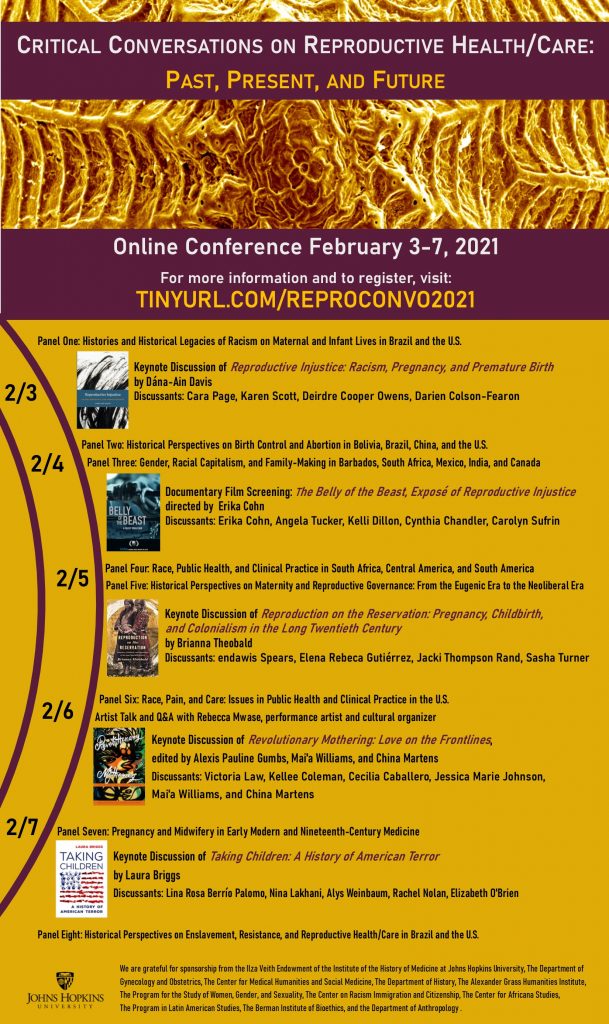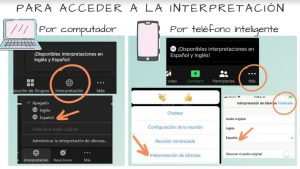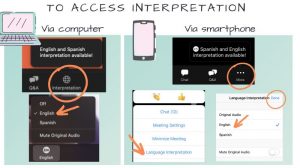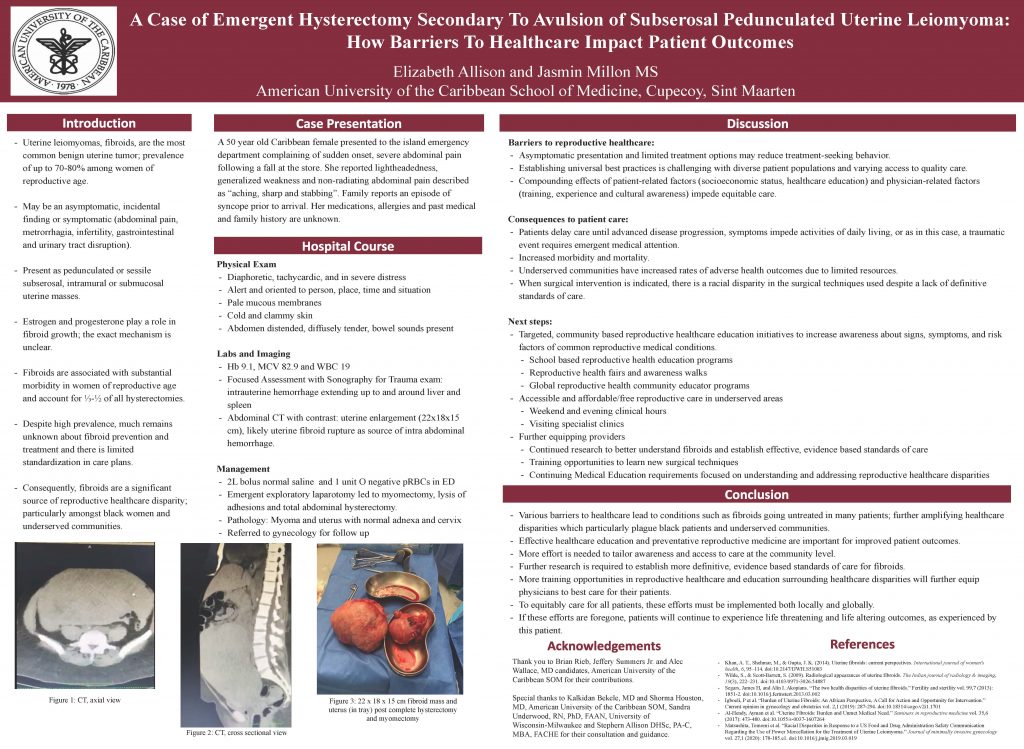#reproconvo2021
Conference: Critical Conversations on Reproductive Health/Care: Past, Present, and Future
Thank you for registering for the online conference “Critical Conversations on Reproductive Health/Care: Past, Present, and Future.” Please use #reproconvo2021 to share your thoughts about our event on social media.
The conference will be held via Zoom Webinar and will be broadcast via YouTube Live. The webinar will remain open for the duration of the event schedule each day.
Audience members will be able to ask questions of the speakers during the conference via the Q&A function of Zoom Webinar. We will not be taking questions from the YouTube broadcast.
Spanish and English live translation will occur on the Zoom Webinar only. The conference will largely be presented in English, but there will be a limited number of presentations in Spanish as well. Presentations with translation are denoted on the schedule of events with an asterisk. If you would like the ability to have any parts of the conference translated, please choose the Zoom Webinar option. More information on how translation works for our conference can be found here.
SPONSORS
We are grateful for sponsorship from the Ilza Veith Endowment of the Institute of the History of Medicine at Johns Hopkins University, The Department of Gynecology and Obstetrics, The Center for Medical Humanities and Social Medicine, The Department of History, The Alexander Grass Humanities Institute, The Program for the Study of Women, Gender, and Sexuality, The Center on Racism Immigration and Citizenship, The Center for Africana Studies, The Program in Latin American Studies, The Berman Institute of Bioethics, and the Department of Anthropology.
SCHEDULE OF EVENTS
FULL SCHEDULE PDF WITH PANEL DETAILS
WEDNESDAY, FEB 3 • THURSDAY, FEB 4
FRIDAY, FEB 5 • SATURDAY, FEB 6
*El asterisco significa que habrá interpretación simultanea al español
*Astrisk denotes simultaneous translation of panel to Spanish
WEDNESDAY FEBRUARY 3
1:30 pm- 3:00 p.m.
Panel One: Historical Perspectives on Sterilization, Reproductive Governance, and Obstetric Violence
Chair: Jennifer Stager
Emily J. Clark, “Perilous Intimacies: Enslaved Women, White Midwives, and Childbirth in Colonial New England.”
Cassia Roth, “Disembodied Reproduction: Enslaved Wet Nurses, Stratified Reproduction, and Commercial Advertisements in Nineteenth-Century Rio de Janeiro.”
Nic John Ramos, “Managing Working Motherhood: The Reproductive Politics of Black and Brown Labor in 1970s Los Angeles.”
Ayodele Foster-McCray, “Racializing Midwifery: A Discussion of Blackness, Gender, and “Alternative” Birth Care in Atlanta, Georgia.”
Monica J. Casper, ““BABYLOST: An Infant Mortality Alphabet Book.”
3:00-3:30 p.m.
*Opening Remarks
Jeremy Greene, Tanjala Purnell, Sasha Turner, Carolyn Sufrin, Jessica Marie Johnson, Elizabeth O’Brien, Darien Colson-Fearon
3:30- 5:00 p.m.
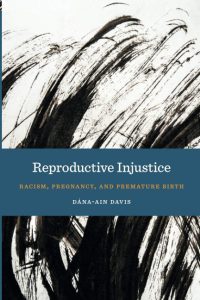 *Reverse Keynote Discussion of Reproductive Injustice: Racism, Pregnancy, and Premature Birth, by Dána-Ain Davis, Professor of Urban Studies and Anthropology and director of the Center for the Study of Women and Society at the Graduate Center of the City University of New York.
*Reverse Keynote Discussion of Reproductive Injustice: Racism, Pregnancy, and Premature Birth, by Dána-Ain Davis, Professor of Urban Studies and Anthropology and director of the Center for the Study of Women and Society at the Graduate Center of the City University of New York.
Featuring
Cara Page, Cultural/Memory Worker, Curator & Organizer
Karen Scott, Associate Professor and OBGYN Hospitalist in the Department of Obstetrics and Gynecology at the University of California, San Francisco
Deirdre Cooper-Owens, Charles and Linda Wilson Professor in the History of Medicine at the University of Nebraska-Lincoln
Darien Colson-Fearon, MD Candidate at the Johns Hopkins University School of Medicine
THURSDAY FEBRUARY 4
12:30 – 1:45 p.m.
Abortion Care During COVID-19: Front-Line Perspectives and the Limits of “Choice”
Talks and Q&A with Diane Horvath, MD, and Carolyn Sufrin, PhD, MD
2:00 – 3:30 p.m.
Panel Two: Historical Perspectives on Birth Control and Abortion in Bolivia, Brazil, China, and the U.S.
Chair: Casey Lurtz
Rhian Lewis, “Essential procedures: Abortion support during COVID-19 in Texas.”
Natalie Kimball, “Reproductive Decision Making in Post-Colonial Bolivia.”
Sarah Mellors, “The Road to the One Child Policy: Grassroots Birth Control and Abortion Practices in China, 1966-1979.”
Brooke Lansing, “With the Strictest Confidence: Abortion and Contraception in Nineteenth-Century New York City.”
4:00- 5:30 p.m.
Panel Three: Reproduction, Racial Capitalism, and Family-Making in Barbados, South Africa, Mexico, and Canada
Chair: Vincenza Mazzeo
Halle-Mackenzie Ashby, “Conscripts of the State: Urban Women in Post-Emancipation Bridgetown Barbados 1864–1890.”
Tessa Moll, “Making Laws, Managing Potentials: A Modern History of ART Family-Crafting in South Africa.”
April Hovav, “Creating a Global Surrogacy Hub: The Case of Tabasco, Mexico.”
Dharashree Das, “Privation, Precaution, and Deliberation: Narratives of Older Women in Delhi, India.”
6:00- 8:15 p.m.
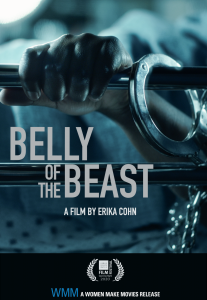 Documentary Film Screening: The Belly of the Beast
Documentary Film Screening: The Belly of the Beast
Panel Discussion and Q&A with
Film Director Erika Cohn
Film Producer Angela Tucker
Film Participant Kelli Dillon
Film Participant Cynthia Chandler
Carolyn Sufrin, Assistant Professor of Gynecology and Obstetrics at the Johns Hopkins University School of Medicine
FRIDAY FEBRUARY 5
1:00 – 2:30 p.m.
*Panel Four: Race-Making in Public Health and Clinical Practice in South Africa, Central America, and South America
Chair: Halle-Mackenzie Ashby
Luisa Madrigal, “Reproduciendo el desarrollo en Guatemala.”
Rilva Lopes de Sousa Muñoz, “Historia del parto en establecimientos de salud del estado de Paraíba, Brasil.”
Michelle San Pedro, “State Control Over Reproduction: The Implications of Phasing Out Traditional Midwives in Nicaragua.”
Vincenza Mazzeo, “The Politics of Pap Smears: The Right to Life and Women’s Anti-Apartheid Organizing in South Africa, 1984-1994.”
Mariana Ramos Pitta Lima, “Reproductive technologies in practice and post abortion treatment in a Brazilian public maternity hospital.”
3:00 – 4:30 p.m.
Panel Five: Historical Perspectives on Maternity and Reproductive Governance: From the Eugenic Era to the Neoliberal Era
Chair: Vincenza Mazzeo
Urvi Desai, “Birth Control and the Motherhood Market in Bombay (1930-60s).”
Sanjam Ahluwalia, “Mapping Histories of Reproductive Health and Governance across India, Pakistan, and Bangladesh: 1947- 2000.”
Aprajita Sarcar, “Women as Sites: The Dichotomies of Family Planning on the ‘Female’ Body.”
Caitlin Fendley, “A “Complex Personal Problem”: Media, Nursing, and Female Sterilization in the 1960s.”
Emma Capulli, “ART and surrogacy: analysis of reproductive autonomy in the complex relationship between clinical labor and new parenting.”
5:00- 6:30 p.m.
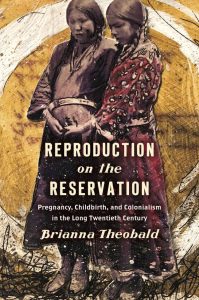 *Reverse Keynote Discussion of Reproduction on the Reservation: Pregnancy, Childbirth, and Colonialism in the Long Twentieth Century by Brianna Theobald, Assistant Professor of History at the University of Rochester
*Reverse Keynote Discussion of Reproduction on the Reservation: Pregnancy, Childbirth, and Colonialism in the Long Twentieth Century by Brianna Theobald, Assistant Professor of History at the University of Rochester
Featuring
endawnis Spears, Director of Programming & Outreach, Akomawt Educational Initiative
Lina-Maria Murillo, Assistant Professor of Gender, Women’s and Sexuality Studies and History, University of Iowa
Jacki Thompson Rand, Associate Professor, Department of History, University of Iowa
Sasha Turner, Associate Professor of History and the History of Medicine at Johns Hopkins University
SATURDAY, FEBRUARY 6
11:00 a.m -12:30 p.m.
Panel Six: Race, Pain, and Care: Issues in Public Health and Clinical Practice in the U.S.
Chair: Jacob Moses
Nicholas Rubashkin, “Evidence-Based Discrimination: the MFMU VBAC success calculator and the implementation of a new racial algorithm in American obstetrics.”
Lotte Elton, “Knowledge, Community, and Care: Biocitizenship in Gestational Diabetes.”
Dionne Bensonsmith and Sophie Paek, “A Different Kind of Labor: Black women, Resilience, and Reproductive Justice in Uterine Fibroid Treatment and Care.”
Nicole Rodi, “Painfully Missing the Mark on Endometriosis: A Historical View of the Disorder, its Misdiagnosis, and Improving.”
Rachel Louise Moran, ““A New-Woman Post-Feminist Idea”: Consumer Activism and Postpartum Depression in the 1980s.”
1:00 p.m. – 2:30 p.m.
Artist Talk and Q&A with Rebecca Mwase, performance artist and cultural organizer
3:00- 4:30 p.m.
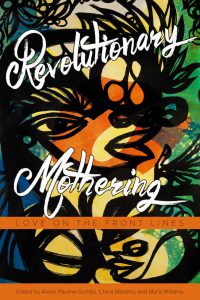 *Reverse Keynote Discussion of Revolutionary Mothering: Love on the Frontlines, edited by Alexis Pauline Gumbs, Mai’a Williams, and China Martens
*Reverse Keynote Discussion of Revolutionary Mothering: Love on the Frontlines, edited by Alexis Pauline Gumbs, Mai’a Williams, and China Martens
Featuring
Victoria Law, freelance author, editor, and organizer
Kellee Coleman, organizer with Vibrant Woman/Mama Sana prenatal clinic
Tanay Lynn Harris, co-founder of the Bloom Collective Baltimore
Cecilia Caballero, PhD Candidate at the University of Southern California
China Martens, organizer, editor, and author
Mai’a Williams, journalist, organizer, editor, and author
Jessica Marie Johnson, Assistant Professor of History at Johns Hopkins University
SUNDAY FEBRUARY 7
11:00 a.m -12:30 p.m.
*Panel Seven: Pregnancy and Midwifery in Early Modern and Nineteenth-Century Medicine
Chair: Mary Fissell, Professor of the History of Medicine, Johns Hopkins University
Scottie Hale Buehler, “Producing Midwives in Eighteenth-century France.”
Paola Uparela, “Regímenes gineco-escópicos de la Modernidad: erotismo y putrefacción en La Parturienta” (Gyneco-Scopic Regimes of Modernity: Erotism and Putrefaction in the Representation of Pregnant Woman).
Paige Donaghy, “Toward a theory of non-re-production: examples from the early modern ‘false conception’ and contemporary ‘molar pregnancy.’”
Saurav Kumar Rai, “Begetting a Male Child: Women Reproductive Health in Late Colonial Ayurvedic Discourse.”
1:00- 2:30 p.m.
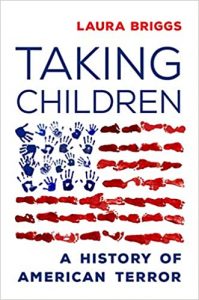 *Reverse Keynote Discussion of Taking Children: A History of American Terror by Laura Briggs, Professor of History at The University of Massachusetts Amherst
*Reverse Keynote Discussion of Taking Children: A History of American Terror by Laura Briggs, Professor of History at The University of Massachusetts Amherst
Featuring
Lorgia García Peña, Associate Professor of History and Literature at Harvard University
Rachel Nolan, Freelance journalist and Assistant Professor of International Relations at the University of Boston
Nina Lakhani, Journalist for The Guardian and freelance author
Lina Rosa Berrío Palomo, Profesora-investigadora de Antropología Social en CIESAS Pacifico Sur
Elizabeth O’Brien, Assistant Professor of the History of Medicine at Johns Hopkins University
3:00- 4:30 p.m.
Panel Eight: Historical Perspectives on Enslavement, Resistance, and Reproductive Health/Care in Brazil and the U.S.
Chair: Christy Thornton
Young su Park, “Implanon: Temporalities and Ethics of Family Planning for Ethiopian Female Migrant Workers.”
Samantha Serrano, and Denise Mattin, “Childbirth and Postpartum Care of Bolivian Immigrant Women in São Paulo, Brazil-Sweatshops, Obstetric Violence and Cariño.”
Sara Matthiesen, “Toward a History of State Neglect: Women of Color and Reproduction in the U.S.”
Morgen Chalmiers, ““Too Many Babies?” Reproductive Governance and the Refugee Subject.”
TRANSLATION SERVICES
The conference will offer Spanish to English and English to Spanish live audio translation via Tilde. Presentations with translation are denoted on the schedule of events with an asterisk.
To access translation services, participants must download Zoom onto their computer or smartphone. Translation Services are not available using Linux or Chromebooks.
Once you have accessed the webinar, please follow the directions below for translation services:
Si usted no es bilingüe, siga estas instrucciones para escuchar la interpretación:
Windows o MacOS: 1) Haga clic en el globo, 2) Indique el idioma que quiere escuchar (inglés / español / etc.) 3) No recomendamos hacer click on “mute original audio”
Android o iOS: 1) En sus controles, haga clic en los 3 puntitos (“more”) 2) Elija “Language Interpretation”; 3) Indique el idioma que quiere escuchar (inglés / español / etc.); 4) No recomendamos hacer click on “mute original audio”
If you are not bilingual, follow these instructions to listen to interpreting:
Windows or MacOS: 1) Click on globe, 2) Click on the language you would like to listen to (English / Spanish / etc.) 3) We do not recommend to “mute original audio”
Android or iOS: 1) In your control panel, click on the 3 dots (“more”) 2) Choose “Language Interpretation”; 3) Indicate what language you would like to listen to (English / Spanish); 4) We do not recommend to “mute original audio” 5) Click on “Done”
FILM EVENT – FEBRUARY 4TH
Join us on Thursday, February 4th for a film screening and Q&A moderated by Carolyn Sufrin and featuring film director Erika Cohn, producer Angela Tucker, and participants Kelli Dillon, & Cynthia Chandler.
Film an be viewed at any time on Thursday, February 4th. Q&A will begin at 7:30 p.m. EST.
To view the film, visit bellyofthebeastfilm.com/020420212 and use password BOTB_020420212
POSTER PRESENTATION
A Case of Emergent Hysterectomy Secondary To Avulsion of Subserosal Pedunculated Uterine Leiomyoma: How Barriers To Healthcare Impact Patient Outcomes
Elizabeth Allison and Jasmin Millon are third year medical students at the American University of the Caribbean School of Medicine. Their poster highlights an emergency department case on a small Caribbean island and explores the ways in which barriers to healthcare impact patient outcomes.
FAQ
Which link should I use: Zoom Webinar or YouTube Live?
Use Zoom Webinar for the ability to ask questions or use Translation Services.
Use YouTube Live for simplicity and ease of use to watch all presentations.
I can’t connect to Zoom Webinar, what do I do?
You can view the conference via YouTube Live. If you believe you are having a technical issue, please email criticalreproductivecare2021@gmail.com.
How can I access translation services?
Translation services are only available through Zoom Webinar. Click here for more information.
For any other technical issues or concerns, please email criticalreproductivecare2021@gmail.com.
STATEMENT OF INTENT
Scholars from across disciplines at the Johns Hopkins University and School of Medicine are organizing a conference entitled “Critical Conversations on Reproductive Health/Care: Past, Present, and Future,” to take place during the first week of February 2021.
This conference will bring together historians, anthropologists, pregnancy caregivers, artists, activists, and journalists to address key issues in the history of reproduction and the practice of reproductive medicine. We are particularly interested in how reproductions intersect with phenomenon such as, but not limited to: midwifery, parenting, and kinship-making; trauma in obstetric and abortion care; obstetric racism in the past and present; colonialism, migration, and displacement; and incarceration and detention.
The virtual meeting will consist of a series of conversations spread over multiple days, and with multiple forms of interaction. It will feature “reverse keynotes,” or discussions of key new books by leading scholars, as well as panel discussions about pre-circulated papers. In addition, there will be a documentary film screening and discussion, as well as community-centered discussions with maternal healthcare activists and artist Rebecca Mwase.
Recognizing that “reproduction” is a loaded term, in part, due to its capitalistic productive connotation, we intend to clarify the complexities of the term by interrogating reproduction as a site of intense struggle for healthcare access and justice; as the site of pressing issues regarding incarceration and decarceration; and as a site of the production and reification of settler-colonial and neo-colonial narratives about race, nation, and autonomy.
We further recognize that activists of color have redefined modern-liberal, whitecentered, and individualistic notions of reproductive choice, and that they have done so by promoting the intersectional teachings of reproductive justice. Inspired by this tradition—and recognizing our limits in engaging with it and drawing on its analytics in our own work—we aim to recognize and learn from historic legacies while envisioning reproductive futures based on dignity, solidarity, and historically-informed collective action.
We also aim to engage with the intimate aspects of reproductive care/taking, especially by unpacking complex notions of parenting, nurturing, and care. In the context of the COVID-19 crisis—which is laying bare the destructive logic of racial capitalism—we recognize that there is no way to “go back to normal.” We must instead envision a radically different future, guided by questions of what kind of society are we producing, reproducing, and nurturing. Can we insist on the value of reproductive labor without ascribing a moralized or normative view of caretaking? How do these discourses come to bear on reproductive health/care, past and present?

